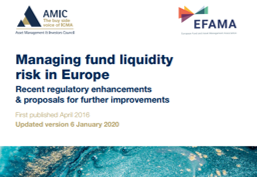EFAMA welcomes the decision of the European Commission to adopt a targeted approach in its review of the Alternative Investment Fund Management Directive (AIFMD), along with key harmonising provisions within the Undertakings for Collective Investment in Transferrable Securities Directive (UCITSD). This focus on targeted improvements recognises the role this framework has played in encouraging the growth in the European Alternative Investment Fund (AIF) market over the past decade and its resilience even throughout recent market stresses.
Management Companies
EFAMA has been looking at legislative proposals with a direct impact on asset management companies and services, and closely follows any regulatory developments of critical importance to the sector. In addition to issues related to risk management and financial stability, high up on the agenda of EFAMA members is the framework for a prudential regime for Investment Firms (IFD/R), and related implementing measures directly descending from such framework.
EFAMA is focused on minimising the impact of the rules on asset management companies, in particular those holding a limited MiFID license. Key to the sector is the need for proportionality, especially firms that are not authorised to hold client money/securities, or to deal on their own account.
FATF Consultation on Recommendation 24
EFAMA welcomes the work of the FATF in reviewing and reinforcing its existing recommendations to ensure that these remain fit for purpose in tackling global financial crime.
AIFMD review - how to tweak a successful framework
EFAMA welcomes the European Commission’s review of the Alternative Investment Fund Management Directive (AIFMD), setting out targeted improvements to key provisions in the current framework. Such targeted improvements will make strides in advancing the Capital Markets Union. At the same time, they maintain the framework which has underpinned a decade of growth in the European Alternative Investment Fund (AIF) market and proven resilient even throughout recent market stresses.
European Statistics Q3 2020 | Net sales of long term funds remained robust in Q3 2020
The European Fund and Asset Management Association (EFAMA) has today published its Quarterly Statistical Release describing the trends in the European investment fund industry
EFAMA Annual Asset Management Report the industry bellwether
The European Fund and Asset Management Association (EFAMA) has published today the 12th edition of its Asset Management Report*. The report aims to provide a unique and comprehensive set of facts and figures on the state of the industry at the end of 2018 but also to highlight the fundamental role of asset managers in the financial system and wider economy.
Monthly Statistics September 2020 | Steady inflows into UCITS equity funds in September
The European Fund and Asset Management Association (EFAMA) has today published its latest monthly Investment Fund Industry Fact Sheet, which provides net sales data of UCITS and AIFs for September 2020*.
Bernard Delbecque, Senior Director for Economics and Research commented: Net inflows into UCITS equity funds remained steady in September despite concerns about rising Covid-19 infection rates and the potential impact of new lockdown measures.
The main developments in September 2020 can be summarised as follows:
Annual Review June 2019-June 2020
"It gives me great pleasure to provide you with an overview of our activities since our Annual General Meeting in Paris last year. While we were very much looking forward to hosting you all in Brussels this week, the current crisis and associated travel restrictions has forced us to improvise and turn our meeting into a virtual AGM.
Investment Funds Distributor Due Diligence Questionnaire
Funds face unique challenges in performing intermediary oversight, and especially so because of MiFID II requirements, changing regulatory landscapes, and the absence of an industry agreed-upon standard between funds and their distribution channels. To help address these challenges, a dedicated working group developed a uniform due diligence questionnaire (DDQ) that will serve as the standard for investment funds (UCITS and AIFs) in performing onboarding and ongoing oversight of distribution channels.
AMIC EFAMA Report - Managing fund liquidity risk in Europe - 2020
In 2019, AMIC and EFAMA decided to update their 2016 report “Managing Fund Liquidity Risk in Europe” following important policy and regulatory developments at EU and international levels. The purpose of this updated report is to outline the practical liquidity risk management processes which fund management companies put in place when setting up a fund and implement throughout the life of the fund. Also, the report describes the existing European and international regulatory frameworks in the area of fund liquidity risk management.

































